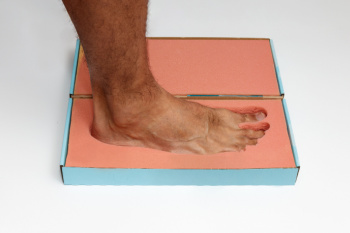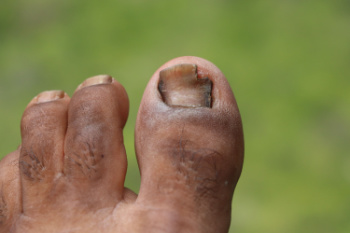Items filtered by date: October 2024
What Are Custom-Made Foot Orthotics?

Custom-made foot orthotics are specialized insoles tailored to an individual’s unique foot structure and specific needs. These devices provide essential support and alignment, helping to alleviate discomfort caused by various foot conditions. Common issues treated with custom orthotics include bunions, which can cause pain and misalignment, and bursitis, an inflammation that leads to swelling and tenderness in the feet. Individuals with diabetes can also benefit, as custom orthotics help prevent complications by improving circulation and reducing pressure points. Additionally, those with flat feet often experience pain and instability, which orthotics can address by providing the necessary arch support. By promoting proper foot function and reducing strain on affected areas, custom-made foot orthotics play a critical role in enhancing mobility, comfort, and overall foot health. If you have specific conditions that would benefit from wearing custom-made orthotics, it is suggested that you consult a podiatrist who can determine which type is right for you.
If you are experiencing discomfort in your feet and would like to try custom orthotics, contact one of our podiatrists from DeCaro Total Foot Care Center. Our doctors can provide the care you need to keep you pain-free and on your feet.
What Are Custom Orthotics?
Custom orthotics are inserts you can place into your shoes to help with a variety of foot problems such as flat feet or foot pain. Orthotics provide relief and comfort for minor foot and heel pain.
Over-the-Counter Inserts
Shoe inserts come in a wide variety and are used to treat foot pain, heel pain, and minor problems. For example, arch supports can be inserted into your shoes to help correct overarched or flat feet, while gel insoles are often used because they provide comfort and relief from foot and heel pain by alleviating pressure.
Prescription Orthotics
If over-the-counter inserts don’t work for you or if you have a more severe foot concern, it is possible to have your podiatrist prescribe custom orthotics. These high-quality, custom inserts are designed to treat problems such as abnormal motion, plantar fasciitis, and severe forms of heel pain. They can even be used to help patients suffering from diabetes by treating foot ulcers and painful calluses and are usually molded to your feet individually, which allows them to provide full support and comfort.
If you're experiencing minor to severe foot or heel pain, it’s recommended to speak with your podiatrist about the possibility of using custom orthotics or shoe inserts. A podiatrist can determine which type of custom orthotic or shoe insert is right for you and help you take the first steps toward being pain-free.
If you have any questions please contact our office located in West Hatfield, MA . We offer the newest diagnostic and treatment technologies for all your foot and ankle needs.
Causes of Toe Discomfort

Aching toes can result from various causes, including arthritis, bunions, hammertoes, nerve issues, or even ill-fitting shoes. Conditions like plantar fasciitis, overuse injuries from sports, or long periods of standing may also lead to toe pain. The discomfort can range from mild soreness to sharp, persistent pain, affecting mobility and daily activities. To manage aching toes, it is important to rest and wear comfortable, supportive shoes. A podiatrist can diagnose the underlying cause of toe pain through a thorough exam and imaging scans. They may recommend custom orthotics, targeted exercises, or in severe cases, surgery to address structural problems. Early treatment helps prevent further complications and restores foot function. If you have toe pain that persists or worsens, it is suggested that you visit a podiatrist for care.
Toe pain can disrupt your daily activities. If you have any concerns, contact one of our podiatrists of DeCaro Total Foot Care Center. Our doctors can provide the care you need to keep you pain-free and on your feet.
What Causes Toe Pain?
Most severe toe pain is caused due to a sports injury, trauma from dropping something heavy on the toe, or bumping into something rigid. Other problems can develop over time for various reasons.
Toe pain can be caused by one or more ailments. The most common include:
- Trauma
- Sports injury
- Wearing shoes that are too tight
- Arthritis
- Gout
- Corns and calluses
- Hammertoe
- Bunions
- Blisters
- Ingrown toenails
- Sprains
- Fractures (broken bones)
- Dislocations
When to See a Podiatrist
- Severe pain
- Persistent pain that lasts more than a week
- Signs of infection
- Continued swelling
- Pain that prevents walking
Diagnosis
In many cases the cause of toe pain is obvious, but in others, a podiatrist may want to use more advanced methods to determine the problem. These can range from simple visual inspections and sensation tests to X-rays and MRI scans. Prior medical history, family medical history, and any recent physical traumatic events will all be taken into consideration for a proper diagnosis.
Treatment
Treatments for toe pain and injuries vary and may include shoe inserts, padding, taping, medicines, injections, and in some cases, surgery. If you believe that you have broken a toe, please see a podiatrist as soon as possible.
If you have any questions please feel free to contact our office located in West Hatfield, MA . We offer the newest diagnostic tools and technology to treat your foot and ankle needs.
What You Eat Can Cause Gout

Gout is a form of arthritis that causes sudden and severe pain, redness, and swelling in the joints, most commonly affecting the big toe. It occurs when uric acid builds up in the bloodstream, forming sharp crystals in the joints. This often leads to intense pain that makes even the lightest touch feel unbearable. Certain foods can trigger gout attacks, particularly those high in purines, which the body converts to uric acid. It is advisable to avoid red meats, organ meats, shellfish, sugary beverages, and alcohol. Instead, focus on a diet rich in fruits, vegetables, and whole grains to help manage uric acid levels. If you are experiencing gout symptoms or have questions about managing this condition, it is important to seek professional guidance. It is suggested you schedule an appointment with a podiatrist to discuss treatment options and preventive strategies, ensuring your feet remain healthy and pain-free.
Gout is a painful condition that can be treated. If you are seeking treatment, contact one of our podiatrists from DeCaro Total Foot Care Center. Our doctors will treat your foot and ankle needs.
What Is Gout?
Gout is a form of arthritis that is characterized by sudden, severe attacks of pain, redness, and tenderness in the joints. The condition usually affects the joint at the base of the big toe. A gout attack can occur at any random time, such as the middle of the night while you are asleep.
Symptoms
- Intense Joint Pain - Usually around the large joint of your big toe, and it most severe within the first four to twelve hours
- Lingering Discomfort - Joint discomfort may last from a few days to a few weeks
- Inflammation and Redness -Affected joints may become swollen, tender, warm and red
- Limited Range of Motion - May experience a decrease in joint mobility
Risk Factors
- Genetics - If family members have gout, you’re more likely to have it
- Medications - Diuretic medications can raise uric acid levels
- Gender/Age - Gout is more common in men until the age of 60. It is believed that estrogen protects women until that point
- Diet - Eating red meat and shellfish increases your risk
- Alcohol - Having more than two alcoholic drinks per day increases your risk
- Obesity - Obese people are at a higher risk for gout
Prior to visiting your podiatrist to receive treatment for gout, there are a few things you should do beforehand. If you have gout you should write down your symptoms--including when they started and how often you experience them, important medical information you may have, and any questions you may have. Writing down these three things will help your podiatrist in assessing your specific situation so that he or she may provide the best route of treatment for you.
If you have any questions, please feel free to contact our office located in West Hatfield, MA . We offer the newest diagnostic and treatment technologies for all your foot care needs.
Plantar Warts Can Be Treated!
Stress Fractures of the Foot and Ankle

Stress fractures are small cracks in the bone caused by repetitive stress, often affecting athletes or those who suddenly increase their activity levels. Common symptoms include localized pain that worsens with activity, swelling, tenderness, and sometimes bruising surrounding the affected area. You may also notice pain that eases with rest but returns when you resume activity. Treatment typically involves resting the affected foot or ankle to allow the bone to heal. In more severe cases, a podiatrist might recommend immobilization with a brace or boot to protect the fracture. Gradual return to activity guided by a podiatrist is vital to preventing recurrence. If you suspect a stress fracture or experience persistent foot or ankle pain, it is suggested that you schedule an appointment with a podiatrist. This type of doctor can perform a thorough evaluation and recommend an effective treatment plan to ensure a full recovery.
Activities where too much pressure is put on the feet can cause stress fractures. To learn more, contact one of our podiatrists from DeCaro Total Foot Care Center. Our doctors can provide the care you need to keep your pain free and on your feet.
Dealing with Stress Fractures of the Foot and Ankle
Stress fractures occur in the foot and ankle when muscles in these areas weaken from too much or too little use. The feet and ankles then lose support when walking or running from the impact of the ground. Since there is no protection, the bones receive the full impact of each step. Stress on the feet can cause cracks to form in the bones, thus creating stress fractures.
What Are Stress Fractures?
Stress fractures occur frequently in individuals whose daily activities cause great impact on the feet and ankles. Stress factors are most common among:
- Runners
- People affected with Osteoporosis
- Tennis or basketball players
- Gymnasts
- High impact workouts
Symptoms
Pain from the fractures occur in the area of the fractures and can be constant or intermittent. It will often cause sharp or dull pain with swelling and tenderness. Engaging in any kind of activity which involves high impact will aggravate pain.
If you have any questions please feel free to contact our office located in West Hatfield, MA . We offer the newest diagnostic and treatment technologies for all your foot and ankle needs.
Early Detection of Toenail Fungus

Early detection of toenail fungus is essential for effective treatment and prevention of complications. Addressing the condition in its initial stages can significantly reduce the risk of the infection spreading to other nails or worsening over time. When identified early, treatment options are generally more straightforward and less invasive, often involving topical antifungal medications. Prompt intervention also helps prevent the toenail from becoming thickened, brittle, or discolored, which can lead to more severe discomfort and difficulty in finding suitable footwear. Furthermore, early diagnosis is particularly important for individuals with underlying health conditions, such as diabetes, who are at higher risk for complications. If you see the beginning stages of toenail fungus, it is suggested that you schedule an appointment with a podiatrist who can offer you treatment remedies, which often includes prescribed medication.
If left untreated, toenail fungus may spread to other toenails, skin, or even fingernails. If you suspect you have toenail fungus it is important to seek treatment right away. For more information about treatment, contact one of our podiatrists of DeCaro Total Foot Care Center. Our doctors can provide the care you need to keep you pain-free and on your feet.
Symptoms
- Warped or oddly shaped nails
- Yellowish nails
- Loose/separated nail
- Buildup of bits and pieces of nail fragments under the nail
- Brittle, broken, thickened nail
Treatment
If self-care strategies and over-the-counter medications does not help your fungus, your podiatrist may give you a prescription drug instead. Even if you find relief from your toenail fungus symptoms, you may experience a repeat infection in the future.
Prevention
In order to prevent getting toenail fungus in the future, you should always make sure to wash your feet with soap and water. After washing, it is important to dry your feet thoroughly especially in between the toes. When trimming your toenails, be sure to trim straight across instead of in a rounded shape. It is crucial not to cover up discolored nails with nail polish because that will prevent your nail from being able to “breathe”.
In some cases, surgical procedure may be needed to remove the toenail fungus. Consult with your podiatrist about the best treatment options for your case of toenail fungus.
If you have any questions, please feel free to contact our office located in West Hatfield, MA . We offer the newest diagnostic and treatment technologies for all your foot care needs.
What Is Peripheral Neuropathy and How Does it Feel?

Peripheral neuropathy is a condition affecting the peripheral nervous system, which consists of the nerves outside the brain and spinal cord. This system relays information between the central nervous system and the rest of the body, controlling sensations, movements, and autonomic functions. Peripheral neuropathy occurs when these nerves are damaged, leading to symptoms like tingling, numbness, pain, and weakness, often in the hands and feet. It can result from diabetes, infections, autoimmune diseases, toxins, or even trauma. Small fiber neuropathy specifically affects the small sensory fibers responsible for pain and temperature regulation. This type of neuropathy can cause burning or stabbing pain, tingling, or sensitivity to temperature. It often occurs in conditions like diabetes, but it can also be caused by other factors such as genetic disorders or autoimmune diseases. If you are feeling symptoms of peripheral neuropathy, it is suggested that you schedule an appointment with a podiatrist for an early diagnosis and management to prevent worsening of symptoms and nerve damage.
Neuropathy
Neuropathy can be a potentially serious condition, especially if it is left undiagnosed. If you have any concerns that you may be experiencing nerve loss in your feet, consult with one of our podiatrists from DeCaro Total Foot Care Center. Our doctors will assess your condition and provide you with quality foot and ankle treatment for neuropathy.
What Is Neuropathy?
Neuropathy is a condition that leads to damage to the nerves in the body. Peripheral neuropathy, or neuropathy that affects your peripheral nervous system, usually occurs in the feet. Neuropathy can be triggered by a number of different causes. Such causes include diabetes, infections, cancers, disorders, and toxic substances.
Symptoms of Neuropathy Include:
- Numbness
- Sensation loss
- Prickling and tingling sensations
- Throbbing, freezing, burning pains
- Muscle weakness
Those with diabetes are at serious risk due to being unable to feel an ulcer on their feet. Diabetics usually also suffer from poor blood circulation. This can lead to the wound not healing, infections occurring, and the limb may have to be amputated.
Treatment
To treat neuropathy in the foot, podiatrists will first diagnose the cause of the neuropathy. Figuring out the underlying cause of the neuropathy will allow the podiatrist to prescribe the best treatment, whether it be caused by diabetes, toxic substance exposure, infection, etc. If the nerve has not died, then it’s possible that sensation may be able to return to the foot.
Pain medication may be issued for pain. Electrical nerve stimulation can be used to stimulate nerves. If the neuropathy is caused from pressure on the nerves, then surgery may be necessary.
If you have any questions, please feel free to contact our office located in West Hatfield, MA . We offer the newest diagnostic and treatment technologies for all your foot care needs.

